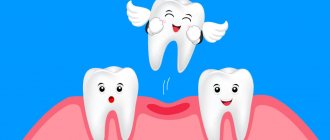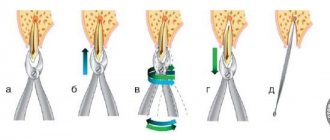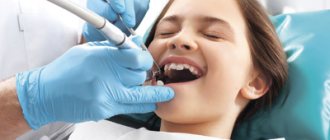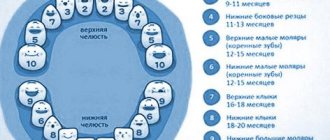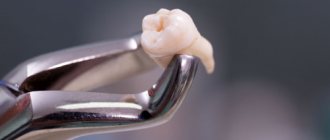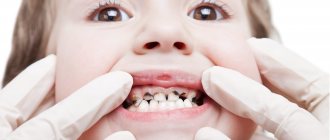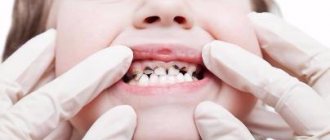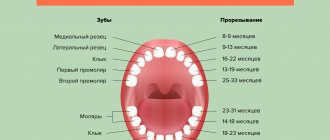When is tooth extraction necessary?
Modern dentistry gives preference to treating teeth to preserve them, but there are pathologies that require removal due to the high risk of complications.
The procedure can be performed urgently or planned. If the tooth is removed after preliminary preparation, the likelihood of complications is minimized. With emergency extraction, negative consequences occur more often. The following pathologies may be indications for tooth extraction:
- damage to the root canal or root;
- periodontitis or periodontitis;
- deep caries, accompanied by significant destruction of the crown;
- advanced hypoplasia;
- neoplasms in the tooth area;
- planned installation of an orthopedic or orthodontic structure;
- developmental anomalies.
Depending on the indications, tooth extraction can be performed using a simple method or surgically. The more tissue is injured, the more severely the body reacts to the intervention.
Can a tooth cause a sore throat and why does this happen?
Yes, maybe it is explained by anatomical proximity. Therefore, it should be understood that we are talking about molars, and sometimes about “wisdom teeth” located close to the pharynx. If the front incisor and throat hurt at the same time, then they are unlikely to be somehow connected. And inflammation, especially purulent, of a molar can spread to the tonsils and submandibular lymph nodes, causing discomfort in the larynx and redness of the mucous membranes; Other symptoms include gingivitis and imaginary ear pain.
Accordingly, they first go to the dentist to solve the problem with a bad tooth. After treatment, doctors prescribe rinses with antiseptic solutions, which also cope with sore throats.
Is the temperature normal or not?
Many patients wonder whether the temperature can increase after tooth extraction? Dentists answer this question positively. Extraction, even despite the quality of modern dental services, causes physiological and psychological stress. After tooth extraction, a temperature of up to 37 °C is considered normal. If the removal was difficult, other signs may be present: swelling of the soft tissues, redness of the gums and slight bleeding. The patient also often feels dizzy and weak. These symptoms disappear within the first day.
Depending on how long the temperature lasts after tooth extraction, we can talk about the risks of pathological processes. A high rate or persistence of temperature for more than 2 days is a sign of an inflammatory process. Accompanying symptoms: the general condition may deteriorate greatly, the gums are very painful, and pus begins to ooze from the socket.
Because immediately after tooth extraction, the hole remains unprotected, and infection can penetrate inside, causing inflammation and other pathological processes. If your condition worsens on the second day after visiting the dentist, you must immediately visit the clinic to avoid further development of the disease.
How to prevent your temperature from rising
- After extraction of a molar, incisor or molar, the doctor’s recommendations should be followed. How to behave as a patient:
- do not eat or drink for the first 2 hours;
- do not chew on the affected part of the jaw;
- do not smoke – preferably for several days and definitely on the first day after the procedure;
- do not rinse your mouth without a doctor’s prescription - this helps wash out the blood clot;
- Until recovery, refrain from visiting public places - baths, saunas, procedures with a cosmetologist;
- do not touch the wound with your fingers or a toothbrush;
- take prescribed antibiotics, anti-inflammatory drugs;
- come for examination at the appointed time;
- do not heat or rinse your mouth with alcohol-containing preparations, vodka, or alcohol.
A day or two after removal, the doctor will prescribe baths with antibacterial drugs. The liquid should be collected and held, but not rinsed.
Complications after tooth extraction
An increase in temperature after tooth extraction is observed more often during surgery to extract impacted teeth, eights, or teeth affected by a purulent process.
After tooth extraction, a temperature of 38° C may indicate the following processes:
- if the doctor’s recommendations for caring for the resulting wound are not followed, alveolitis (inflammation of the socket) may begin as a result of tissue perforation or against the background of a weakened immune system;
- if during extraction the doctor does not remove all the roots, then a pathological formation - a granuloma - may form on their parts;
- with the penetration of infection and concomitant inflammation, a purulent-necrotic process of damage to the jaw bone tissue (osteomyelitis) begins, which can lead to gangrene or an abscess;
- in case of damage to blood vessels during the extraction process, a hematoma develops, subsequently leading to the formation of a cyst or a purulent process.;
- in exceptional cases, temperature is only a concomitant sign of chronic sinusitis.
In order for the treatment to be effective, the specialist needs to determine the reason why the temperature rose after tooth extraction. It is possible that the patient will require repeated intervention, but more often it is possible to manage with therapeutic treatment.
Indications and contraindications
Doctors do not recommend treating or removing teeth for ARVI symptoms. The fact is that even the immunity of a healthy person does not always cope with protection. If the immune system is weakened by a cold, the likelihood of complications increases.
You can cancel a visit to the dentist in case of planned operations. In addition, during a cold you should not install an implant, remove tumors and wisdom teeth, or perform plastic surgery in the oral cavity in preparation for certain types of treatment.
However, a cold is not an absolute contraindication to dental procedures. If the disease is mild, then it is possible to take an impression to make dentures, remove tartar or bleach the enamel. Treatment is also carried out in emergency cases, when the cause of the pain can cause the development of serious complications, these include:
- odontogenic periostatitis in acute form;
- acute pain when cutting through the figure eight;
- periodontitis of a traumatic nature;
- inflammation of the mucous membrane;
- inflammation of the trigeminal nerve;
- periodontitis;
- phlegmon;
- abscess;
- injuries;
- abscess.
In such situations, you should consult your doctor. He will decide on an individual basis whether dental procedures should be carried out now or whether they can be postponed until the end of the illness.
When to visit a doctor
Since fever may be normal after tooth extraction, many patients do not consult a doctor, believing that the condition is explained by the procedure. However, dentists identify signs that make it necessary to immediately make an appointment or even go to the clinic for emergency care.
Pathological symptoms after tooth extraction:
- maintaining temperature for more than 3 days;
- increase in indicators more than 37 °C;
- the feeling of pain intensifies;
- swelling increases and redness spreads;
- severe bleeding from the wound;
- persistence of bleeding for more than 2 days;
- discharge of pus from the socket.
To alleviate the condition, you can take a pain reliever or a drug to reduce the temperature. Trying to clean the wound on your own or using any other methods is not recommended. Self-medication can lead to serious complications.
Visiting the dentist if you have a cold
There is no consensus regarding the possibility of dental treatment for colds; doctors act according to the circumstances. For example, acute toothache is the basis for immediate treatment. In certain situations, the patient does not want to reschedule a visit to the doctor; clinic staff have the right to refuse to provide services in order to prevent infection of other patients.
Explanations from a qualified specialist will help you make the right decision and cancel your planned visit to the dentist. Dental treatment is accompanied by the risk of injury to the gums; wounds are a “road” for infection. In addition, painkillers can become a cause of deterioration of well-being during ARVI. A cough and runny nose are an obstacle to the dentist’s manipulations; the patient cannot stand it with his mouth open for a long time. Pauses have a negative impact on the quality of treatment; in addition, the possibility of infection of the doctor cannot be ruled out.
What can a dentist do?
Even in case of complications after tooth extraction, a qualified dentist can provide assistance and provide effective treatment. Depending on the causes and existing consequences, the specialist will prescribe the necessary treatment or carry out the necessary procedures.
The main goal of the dentist is to clean the hole from necrotic tissue, eliminate infection and relieve inflammation. After stabilization of the patient’s condition, therapeutic treatment aimed at tissue restoration begins. Rehabilitation will be difficult and take a lot of time.
To prevent complications after tooth extraction, dentists recommend following all wound care tips, taking prescribed medications for complex extractions, and monitoring the temperature. If you consult a dentist at the first sign, treatment will proceed quickly and serious consequences will be avoided. When planning a tooth extraction, it is necessary to properly prepare for the procedure by undergoing preliminary diagnostics and eliminating inflammatory processes in the body.
Case 4. The source of inflammation at the root of the tooth - the so-called. cyst
Imagine the situation.
A tooth that previously did not have a filling or was previously treated endodontically begins to hurt. An examination is carried out, X-ray control is done, but often a more informative cone-beam computed tomography CBCT or, as many say, a 3D x-ray is performed. A dental cyst is detected. The doctor recommends removing the tooth because there is a large area of inflammation at the top of the tooth root, caused by an infection in the root canal. The infection gets beyond the root tip and causes inflammation. This inflammation can be treated by removing the infection from the root canal. It is easier for a doctor who does not have the knowledge and treatment methods to remove a tooth.
How to do it right:
There is no need to remove the tooth. In the case of a dental cyst, it is necessary to carry out diagnostics, examination and high-quality treatment under the control of an operating microscope with isolation of the working field, followed by hermetically sealed restoration of the tooth at the stage of endodontic treatment. The recommendation is simple:
before removing a tooth, consult a professional. You may not need tooth extraction! This means that sinus lifting, implantation and prosthetics procedures following the removal will not be necessary.
After root canal treatment
Endodontic therapy involves complex manipulations. After it, your health may actually worsen. How long the painful condition will last depends on the degree of damage to the tissues of the oral cavity and the extent of the abnormal process.
Pulpitis itself rarely provokes fever, but its complications - periodontitis, cysts, periostitis, any purulent processes - quite often. Hyperthermia occurs in response to an inflammatory response. In parallel, the following may be observed:
- swollen lymph nodes;
- strong pain;
- swelling of the cheek;
- gum “bump”;
- discharge of purulent masses.
If after endodontic intervention the elevated temperature lasts longer than two to three days, you should definitely consult a doctor. This must be done immediately if the tooth hurts or pus flows.
Why is dental treatment not recommended for sore throat?
A sore throat prevents you from opening your mouth wide, as dentists like. The patient will not sit through the entire procedure with inflamed and tense tissues of the pharynx, and the doctor will not provide the service of the required quality.
In addition, fear of the dentist, layered with fever and sore throat, will cause additional stress and completely undermine the body.
In bacterial forms of sore throat, the tongue is heavily coated with plaque containing microorganisms. This is a danger to the doctor and the patient’s health (autoinfection).
If we summarize all of the above, it turns out that it is better to reschedule the visit to the clinic. After all, with such strong-willed decisions, dentists take care of the health of both themselves and their patients. But sometimes these rules are deviated from in order to help people with sore throats.
